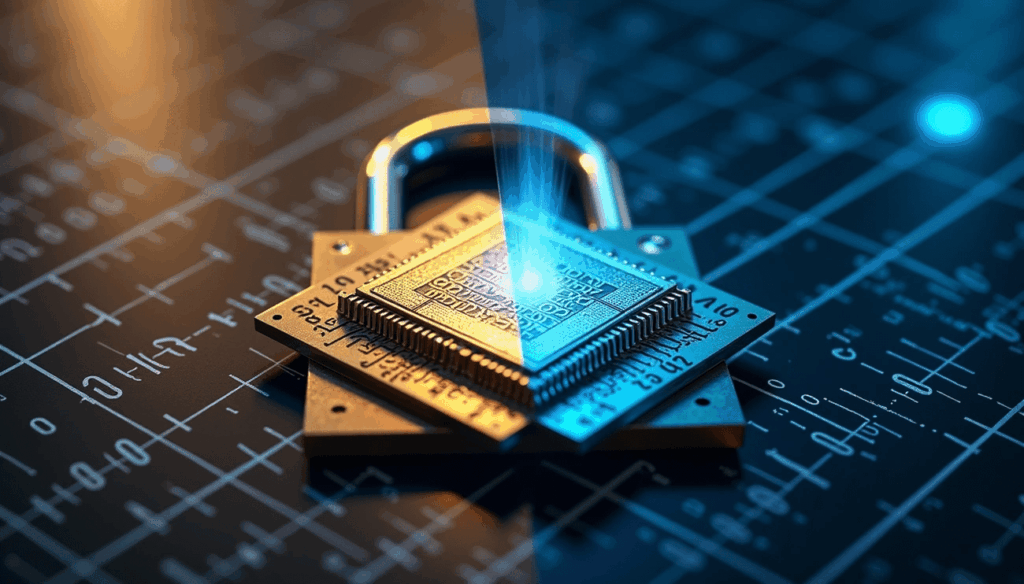Quantum computing and cybersecurity are heading toward a clash that will transform how we protect our data. However, this technological breakthrough could break through current encryption systems like RSA and elliptic curve cryptography in the next twenty years. Current encryption methods depend on complex math problems that regular computers struggle to crack.
The way quantum computing affects cybersecurity runs deep, and companies already see this threat coming. Our security systems face the risk of becoming outdated, and quantum computing brings major challenges to the table. Yet it also provides answers through quantum-safe security algorithms that can resist attacks from future quantum computers.
This piece explores how quantum computing affects traditional encryption methods and the steps needed to protect our data in this emerging era.
How Quantum Computing Breaks Traditional Encryption
A fundamental change looms over traditional encryption. This vulnerability exists because quantum machines process information differently. Shor’s algorithm, discovered in 1994, can factor large numbers that are the foundations of modern cryptography. A powerful enough quantum computer could use this algorithm to reduce the time needed to break encryption from trillions of years to just eight hours.
The situation becomes even more alarming because public-key cryptography tech secures about 90% of internet connections during the SSL handshake. Quantum computers with sufficient power could decrypt sensitive information such as:
Personal medical and criminal records
Financial data such as bank accounts and credit card numbers
Commercial research and intellectual property
Classified national security information
Experts disagree on timing, but many predict cryptographically relevant quantum computers will emerge in the next 5-15 years. The “harvest now, decrypt later” threat also raises serious concerns. Adversaries can collect encrypted data today and decrypt it once quantum technology matures.
Quantum Key Distribution and Quantum Internet
Quantum physics offers a promising shield against quantum threats that goes beyond mathematical solutions. For example, Quantum Key Distribution (QKD) lets two parties create a shared random secret key that can spot any attempts to eavesdrop through quantum properties like entanglement and the no-cloning theorem. The quantum state gets disturbed when an eavesdropper tries to intercept photons carrying encryption keys. This alerts the communicating parties right away about the security breach.
QKD’s security comes from the basic laws of physics rather than mathematical assumptions.
The BB84 protocol, which came to life in 1984, stands as the most prominent QKD implementation. This innovative approach sends individual photons through fiber optic cables and uses their polarization to encode data bits. Scientists have already put QKD to real-life use. Austrian researchers secured bank transfers to Vienna City Hall with QKD back in 2004.
The concept of a quantum internet is evolving faster than other QKD connections. This network would send information in qubits instead of classical bits. It creates secure communications where anyone can physically detect unauthorized access. In spite of that, Quantum signals lose their entanglement during amplification, and implementation weaknesses can break theoretical security guarantees.
Ethical and Global Implications of Quantum Security
The race for quantum supremacy reaches way beyond the reach and influence of technological innovation and enters complex ethical territory. Security alliances like AUKUS and NATO have smoothly combined quantum technologies with their strategic frameworks. This shows how national security and emerging technology continue to intersect.
Moreover, a worrying “quantum divide” now threatens our future. Nations with advanced quantum technology will have secure communications, while others remain exposed. Such imbalances could create power gaps between countries and might increase diplomatic mistrust that weakens international alliances.
To prevent this from happening, we need more international cooperation. The U.S. Government stresses that international QIST activities should promote open and fair pursuit of science and technology, including respect for intellectual property, data sharing practices, and standard-setting processes. Yes, it is possible that some countries might try to control standards creation to gain competitive edges.
The development of “crypto-agility” and ethical frameworks for quantum governance has become crucial. This approach helps balance welcome innovation with responsible development as we guide ourselves through this unprecedented technological frontier.
Conclusion
Quantum computing will revolutionize our future. Traditional encryption methods protecting our sensitive data will become obsolete when quantum computers gain sufficient power. Post-quantum cryptographic solutions must be implemented before adversaries can exploit these vulnerabilities.
Standardization of quantum-resistant algorithms represents a most important advancement. The transition to these new standards needs substantial planning and resources. Your organization should start inventorying cryptographic assets and develop migration strategies now, despite the challenges ahead.
Our response to these challenges will determine our data’s security and shape the fairness and stability of our digital world. The time to prepare for this quantum technology transformation isn’t tomorrow, but today.


